Study in Canada
IRCC Raises Living Cost Requirement for Canada Study Permit Applicants for International Students

Starting September 1, 2025, Immigration, Refugees and Citizenship Canada (IRCC) will increase the minimum proof of funds required to secure a Canada study permit. This adjustment reflects inflation and growing living costs across the country and is part of Canada’s annual cost-of-living review. For a single applicant, the required amount for living expenses will rise from $20,635 to $22,895—an increase of over $2,000, not including tuition or travel expenses.
New Financial Benchmarks for Canada Study Permits in 2025
IRCC’s updated guidelines apply to all provinces and territories except Quebec, which sets its own financial standards under a separate agreement. Here’s a breakdown of the revised fund requirements based on family size:
| Family Size | Annual Funds Required (CAD) |
| 1 | $22,895 |
| 2 | $28,502 |
| 3 | $35,040 |
| 4 | $42,543 |
| 5 | $48,252 |
| 6 | $54,420 |
| 7 | $60,589 |
| Each Additional | $6,170 |
This increase is meant to ensure that international students can comfortably support themselves in Canada without placing pressure on public services or falling into financial difficulty.
What Kind of Proof Will IRCC Accept?
To meet this updated requirement, applicants will need to present clear, verifiable financial documentation. IRCC allows a variety of documents as acceptable proof of funds, including:
- A Canadian bank account in the applicant’s name
- A Guaranteed Investment Certificate (GIC)
- Official bank statements (last 4 months)
- Proof of a student or education loan
- Bank drafts convertible to Canadian dollars
- Letters confirming scholarships or funding support
- Letters from financial sponsors
- Documentation from government-funded education programs
All proof must clearly demonstrate that funds are readily available and sufficient for both living and study-related expenses.
Who Needs to Follow the New Rules?
Any student submitting a new study permit application on or after September 1, 2025 will be subject to these updated financial benchmarks. Applications submitted before that date will be evaluated under the previous requirement of $20,635. This update affects non-Quebec-bound students only, as Quebec continues to manage its own study permit financial thresholds under a provincial agreement.
Why Is IRCC Raising the Bar?
Canada’s decision reflects a wider concern: ensuring that international students are financially secure upon arrival. Rising costs in housing, groceries, transit, and utilities have made financial planning more critical than ever.
The key goals behind this change include:
- Reducing student vulnerability and financial stress
- Minimizing reliance on emergency aid or public housing
- Encouraging institutions to enroll students who are genuinely prepared for Canadian living standards
This move also aligns with broader government efforts to manage student intake more responsibly amid housing shortages and growing demand for student support services.
How Should Future Students Prepare?
The new financial rules may feel daunting, but with proper planning, they’re entirely manageable. Students should:
- Begin budgeting early for tuition and living costs
- Gather reliable proof of funds in advance
- Consult with immigration experts to ensure documentation is complete and compliant
Canada remains a top destination for world-class education, but staying informed is essential. With the Canada study permit fund requirement increasing in September 2025, applicants must act now to stay eligible. Subscribe to Canada Immigration News for up-to-date immigration news, expert insights, and personalized support every step of the way.
























